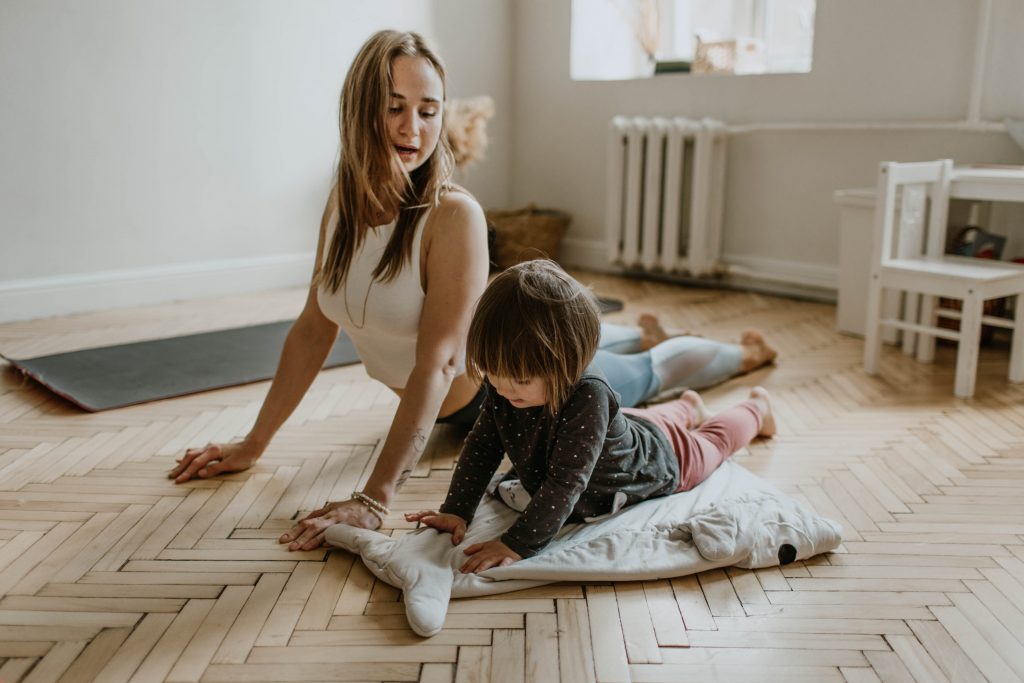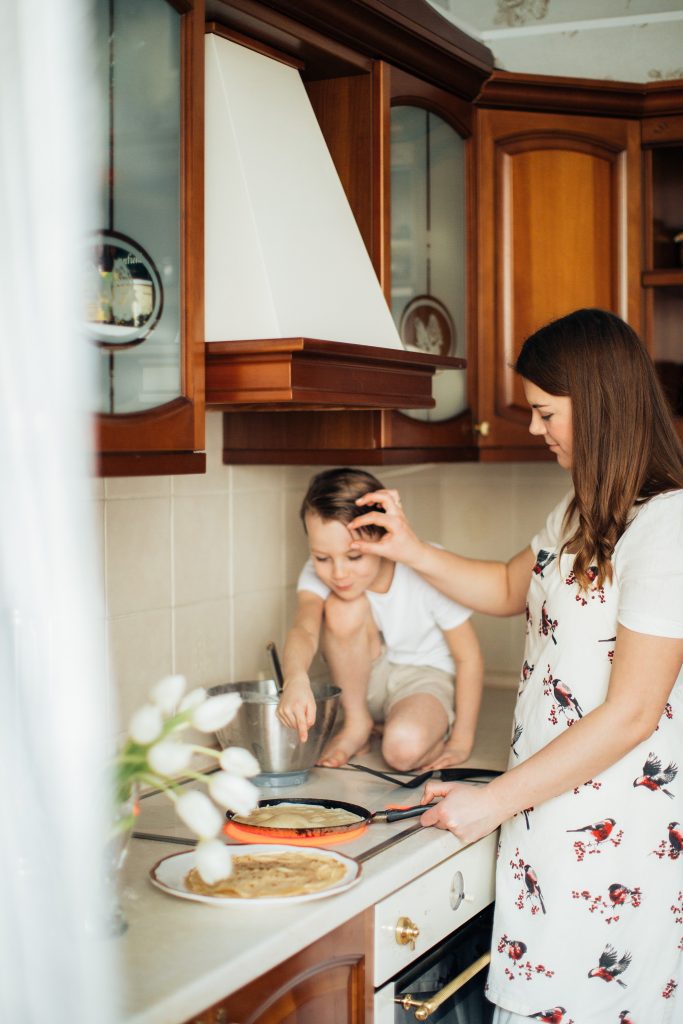September is Childhood Obesity Awareness Month, and to be honest, it’s an awareness month I only recently learned about.
In the time of social media, I think we’ve become accustomed to an influx of health-related articles for adults — the benefits of this or that diet, how to “keep the weight off,” and how to find time for exercise when you have kids and a job. We’re used to being bombarded by this information, even if the content is often too focused on diet culture. But talking about healthy habits (and especially preventing excessive weight gain) in children can be a more delicate and sensitive subject. Children are impressionable. We want to ensure their good health at an age when healthy habits are being developed, but we don’t want to ever shame them. After all, body positivity and healthy body image are just as important.
I’m not a nutritionist. I’m not a personal trainer. I’m not a researcher on childhood obesity. But what I am is a mom who overcame a nine-year battle with eating disorders and black-and-white thinking about weight and health. I now embrace moderation and model healthy habits for my children in hopes that they don’t struggle in the future. I want them to appreciate eating well and treating their bodies well.
It’s hard to hear, but parents do have to accept a lot of responsibility for the example they set for their children. If your children don’t see you eating well and treating your body well, how can you expect them to do so?
Here are some things that my husband and I practice, and hopefully they might inspire you to continue to work on modeling healthy habits.
*Also, a quick reminder that we are not perfect (spoiler: we sometimes indulge in fast food and desserts, and that’s OKAY), but working each day to be intentional about living a healthy, balanced lifestyle is key.
Childhood Obesity :: Modeling Healthy Habits for Your Children
We don’t say we’re going to workout. We do.
You can’t expect your child to appreciate physical activity if you are not active or if you talk about exercise like it’s something awful you are forced to do. Remember that it is a privilege to have a healthy and working body! Sometimes I have to remind myself that I am only given one body and I must treat it well. We are all busy, but we have to make activity a priority. My husband and I switch off nights that we go to the gym. It’s our preference. In fact, any time we leave the house at night, our children say, “Mommy/Daddy is going to the gym!” It’s so embedded in our family life that every time they see us leave after a certain time, they assume we are working out. To me, this shows them that exercise is something you do regularly and look forward to.
A gym may not be an option for everyone for various reasons, but there are so many ways to be active without a gym membership. Sometimes, I choose to go for a run around the neighborhood or put on a free workout video from YouTube or Prime while I find something to occupy the kids (kinetic sand, for the win!). In the same way you want to show your children your passion for work or hobbies, find a style of activity — running, Pilates, yoga, weight lifting, or dance, maybe — that makes you happy. Let your kids see you get excited about being healthy!

We model and encourage healthy eating.
Likewise, you can’t expect your kids to eat well if they see you eating foods with no nutritional value all the time. No one is perfect, and kids can be picky and have sensory issues surrounding food. I get this more than most. My home is not a healthy eating haven. I’d be lying if I said that! My kids don’t eat a perfectly well-rounded diet all the time. We battle picky eaters and sensory issues on the daily. But the best thing I can do as a mom is let them see me try and enjoy a variety of foods. I’m a vegetarian and my husband is not, but we both love non-American cuisines (we eat Thai food and Indian food frequently). I talk about how delicious these foods are and encourage my kids to at least try them. Meat and potatoes only have to be staples in your diet if you choose for them to be!
In reality, there is a world of different cuisines about there — and I think when children learn to appreciate good and healthy food, it makes all the difference. Show your children how to make their plates colorful and how to savor good, nutritionally-sound food. Talk to them about flavor. Sometimes, I will talk about the food groups on my plate with my children and how they all benefit my body in different ways. And in our house, even though we’re certainly not always successful with these things being eaten, we include fruits and/or veggies with every meal and talk to our children about why these things are so important for our bodies.
On the flip side, it’s also okay to enjoy desserts and chips sometimes. The key is for your children to see that you don’t always eat these things, but when you do, you enjoy them and you do NOT shame yourself for eating them. Good and healthy foods are important, but less healthy foods are not “bad” or shameful or wrong. They are just a smaller part of an overall balanced diet and mindset toward food.
We make it a family affair!
We usually take a nightly walk together as a family. We talk about fun topics so that our kids can see that being active can be fun and engaging, too. My son loves to take “themed” walks, so he picks the topic and that’s what we talk about on that walk. Or sometimes we play “I spy” (the three year old loves it). It keeps things interesting! We often visit playgrounds and parks together on the weekends. It doesn’t need to be elaborate — just be active with your kids. Pull out the scooters, bikes, and trampolines!

We cook with our children.
Admittedly, this is something that I only recently started doing since I began homeschooling. I think that is extremely beneficial because children can learn to feel responsible for their own food, and it encourages good discussions about what goes into healthy and delicious food (two things that are not opposites!). I keep it simple with my three year old, but I let my five year old do more in the kitchen. It’s been a great way to connect with him and to let him see what ingredients go into our meals, how they make food taste, and the importance of using real ingredients. I believe that the goodness of food is less appreciated if we are always just grabbing takeout.

We do not speak negatively about our bodies in front of our children. Ever.
This is critical. If we’re going to model healthy eating and exercise habits, we can’t forget that we must model a healthy attitude toward our bodies, as well. Today, we see kids developing eating disorders at younger ages and expressing a dislike of their bodies. Just like we watch “cuss words” around our children, we must be equally as motivated to watch the language we use about our bodies and the bodies of others around our children.
Please don’t ever talk about your diet around your children. Please don’t ever talk about how you dislike your weight around your children. Please don’t ever talk about how you’re “bad” for enjoying ice cream or how you need to run extra miles tomorrow to “work off” that fried food. And please don’t comment on the bodies of other men and women. (Besides, we should focus more on complimenting people for non-physical qualities.)
Your children are always listening and watching, and what is the message you want them to hear? If your daughter thinks Mommy hates her thighs and she has similar thighs, what message does that send? If your son hears you constantly compliment people who have the opposite body type, what message does that send? If we are experiencing body image issues or harmful habits surrounding food and exercise, we must seek out appropriate help so we can get healthier and be positive role models for our children.











